 Petzlover
Petzlover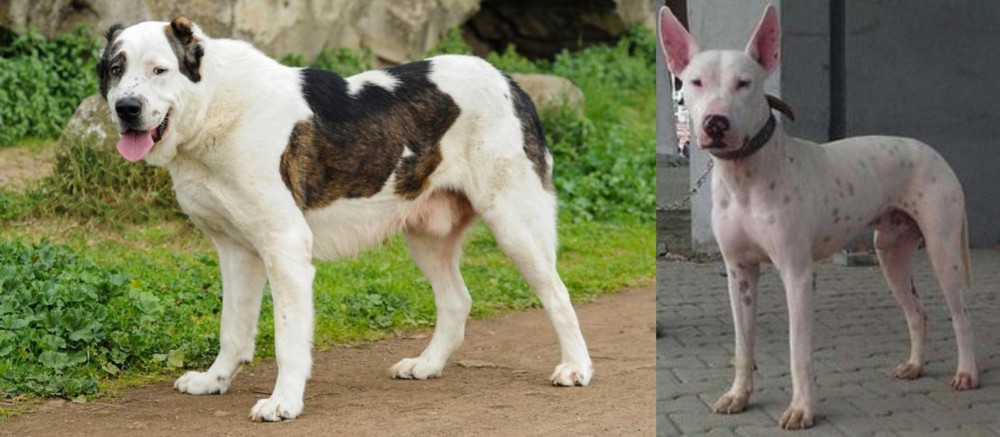 Central Asian Shepherd is originated from Russia but Gull Terr is originated from Pakistan. Both Central Asian Shepherd and Gull Terr are having almost same height. Both Central Asian Shepherd and Gull Terr are having almost same weight. Central Asian Shepherd may live 3 years more than Gull Terr. Both Central Asian Shepherd and Gull Terr has almost same litter size. Central Asian Shepherd requires Moderate Maintenance. But Gull Terr requires Low Maintenance
Central Asian Shepherd is originated from Russia but Gull Terr is originated from Pakistan. Both Central Asian Shepherd and Gull Terr are having almost same height. Both Central Asian Shepherd and Gull Terr are having almost same weight. Central Asian Shepherd may live 3 years more than Gull Terr. Both Central Asian Shepherd and Gull Terr has almost same litter size. Central Asian Shepherd requires Moderate Maintenance. But Gull Terr requires Low Maintenance
 This large dog breed is a native to the wilds of Central Asia, where it has been guarding and protecting livestock for thousands of years. In fact the Central Asian Shepherd is one of the oldest dog breeds of the world.
This large dog breed is a native to the wilds of Central Asia, where it has been guarding and protecting livestock for thousands of years. In fact the Central Asian Shepherd is one of the oldest dog breeds of the world.
Early records as to the precise origin of the breed aren’t available. There are suggestions that the breed descended from ancient Middle Eastern livestock guarding breeds, while the other suggests the dog is descended from the Tibetan Mastiff. It is almost certain that the dog was domesticated from the Wolf.
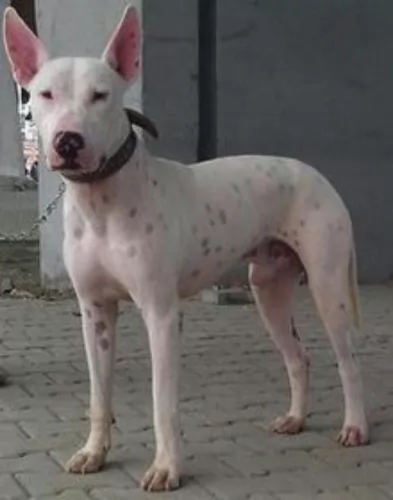 The Gull Terr hails from Pakistan. Having been introduced to the country by the British Raj, the dog has always been valued for its guarding and fighting abilities.
The Gull Terr hails from Pakistan. Having been introduced to the country by the British Raj, the dog has always been valued for its guarding and fighting abilities.
The British army, on bringing English Bull Terriers with them, mated them with local dogs. The dog was in other words, created from the old bull terrier which became extinct, and the Bully Kutta.
The Gull Terr or Pakistani Bull Terrier as he is known is a rare breed of dog. Today they are usually found in rural areas of Pakistan as well as in the Indian Panjab area, becoming popular as both pet and watchdog. It is no longer used for dog fighting as this has been banned.
 The Central Asian Shepherd is a large dog, standing at up to 70cm in height and weighing in the region of 50kg. The dog is powerfully built and muscular, with the tail being traditionally docked to a short bob. Undocked, the tail is naturally long, thick at the base and tapering down. When relaxed, the tail is carried low, but when he becomes alert and excited, the tail is up and curved.
The Central Asian Shepherd is a large dog, standing at up to 70cm in height and weighing in the region of 50kg. The dog is powerfully built and muscular, with the tail being traditionally docked to a short bob. Undocked, the tail is naturally long, thick at the base and tapering down. When relaxed, the tail is carried low, but when he becomes alert and excited, the tail is up and curved.
The ears of this dog are also traditionally cropped close to the head so that the dog almost appears to have no visible ears. This practice is also falling away and the natural ears of this breed are small and set at- or below eye level.
The brown eyes are small to medium size and are deep set. The Central Asian Shepherd Dog is double-coated with short to medium length hair and can be found in quite a few different colors such as tan, white, black, grey, brindle, ticked or a blend of these colors.
You have to be careful about where you buy your Asian Shepherd from as these dogs can be prone to aggression. With good breeding however, the dog is evenly tempered. As a first time dog owner, this shouldn’t be your first choice as it is a dominant, wilful, territorial, independent dog who will require a tough, firm, strong owner. Training and socialization are imperative to ensure he becomes obedient. He is then capable of forming close and strong bonds with his master, becoming a loyal and devoted pet. He also makes an excellent guard dog.
He is a protective dog breed, and once trained can get on well with children and other pets. He is the kind of dog that you will want to supervise around small children.
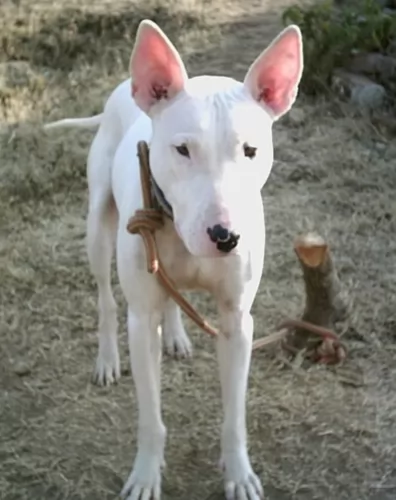 As a medium sized dog, the muscled Gull Terr stands as 45 – 66cm in height and weighs in the area of 40 – 45kg.
As a medium sized dog, the muscled Gull Terr stands as 45 – 66cm in height and weighs in the area of 40 – 45kg.
The dog has a short, smooth coat which is white, but you may find some black spots on him. He has a egg shaped head, ears are naturally erect, dark slanted eyes, and he has a long tail which is held upwards. Muscled and agile, he is a powerful working breed and makes a good watchdog.
This is an aggressive dog breed, and first-time dog owners might want to have a more amicable kind of pet to start off with.
He is a fearless dog, somewhat aggressive and suspicious towards strangers and therefore wants to protect his owner from them. With training and socialization he can be good with children in the home, although he is inclined to be boisterous and stubborn. He has fierce protective instincts, even though he is considered not as aggressive as some other Pakistani dog breeds.
The Gull Terr will need an experienced dog handler. Even though he has been a fighter in his day, he is capable of being an excellent family pet as well. You won't have trouble training him as he is intelligent. He then becomes more obedient and more manageable. He is a very active dog and therefore he won't fit into city dwelling where there are small spaces. He needs a place to run and on top of that he will require a good deal of exercise.
 It is important for those interested in the Central Asian Shepherd Dog as a pet to do some research on the breed. For instance this is a large dog that has been used for fighting.
It is important for those interested in the Central Asian Shepherd Dog as a pet to do some research on the breed. For instance this is a large dog that has been used for fighting.
While he can’t be described as being overly aggressive, you do need to be aware of his history, especially when you have small children in the home.
This dog is intelligent and confident too while also being exceptionally protective, and therefore he makes a good watchdog.
It is essential to have your Central Asian trained and socialized, and then he becomes far more relaxed and obedient, making him a loyal, loving guardian and friend.
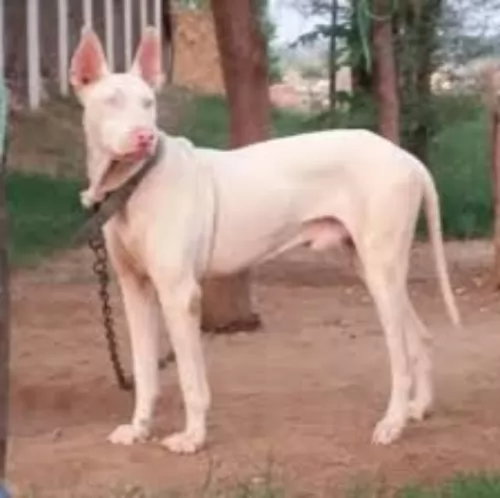 Your Gull Terr love the attention he receives from his human family and he won’t flourish at all if he is put into the back yard for watch dog purposes only. He is a dog that needs to come indoors to be with his family.
Your Gull Terr love the attention he receives from his human family and he won’t flourish at all if he is put into the back yard for watch dog purposes only. He is a dog that needs to come indoors to be with his family.
He tends to be somewhat aggressive and this is why he isn’t looked upon as the ideal pet for first-time dog owners and those with young children in the home.
He is a confrontational dog, willing to enter into a fight with provocation. Strong willed he will require early training and socialization, and when he is brought up by a firm, consistent, kind owner, he can get over his aggression and become a loyal, devoted, protective and loving pet.
 The Central Asian Shepherd doesn't have any hereditary ailments and he is generally a healthy, robust breed.
The Central Asian Shepherd doesn't have any hereditary ailments and he is generally a healthy, robust breed.
Large breeds are always prone to hip- and elbow dysplasia, an abnormal development of hip and elbow, brought about by a number of factors such as genetics, the wrong diet and rapid growth with some large puppies.
A dysplastic hip or elbow doesn’t move smoothly as it should, and this results in joint inflammation and pain. Symptoms can include loss of muscle mass, pain when moving around and difficulty with standing up again once your pet lies down.
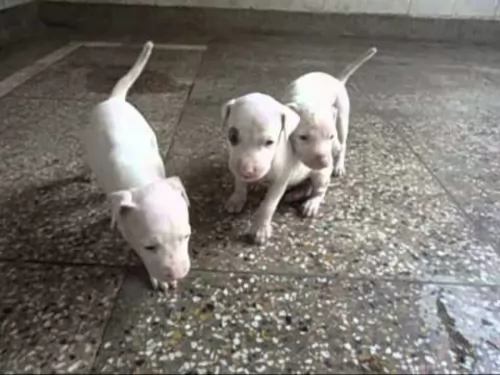 The Gull Terr has a deep chest and this means he is more prone to bloat, a condition known as gastric dilation volvulus.
The Gull Terr has a deep chest and this means he is more prone to bloat, a condition known as gastric dilation volvulus.
Your pet's stomach fills with air and this leads to decreased blood flow to vital organs. The stomach can twist and this is when the condition becomes life threatening as blood supply to the stomach is cut off. Instead of feeding him large meals, feed him smaller meals more frequently.
Deafness in your pet can be temporary or permanent, in one ear or both. There are are so many reasons why your pet could be deaf and it could be a birth defect, an infection or old age. Certain dogs such as the white coated Gull Terr are also more predisposed to congenital deafness.
Get him to the vet who will examine your dog’s ear canal for wax and debris and discuss the way to go for your beloved pet.
 Central Asians are large dogs and when he is looked after well he can reach up to 15 years of age.
Central Asians are large dogs and when he is looked after well he can reach up to 15 years of age.
It is important to see that he receives top quality, size-specific food, of which he eats a lot, and that it has all the vitamins and minerals he needs for his size.
A puppy will need high energy foods because of their energy. As he grows bigger, protein will become imperative. It is always a treat for your pet to add in some brown rice, vegetables and cooked chicken into his kibble from time to time.
Raw meat can be expensive, but if you can, it is important to ensure that your large pet gets some raw meat into his diet too, to keep his skin and coat healthy and to ward off disease. Make sure he has non-stop access to a bowl of fresh, cool water.
As previously mentioned, the coat of the Central Asian Shepherd can be fairly short but it can also be medium length. He isn't going to require any exceptional grooming but you will certainly need to give him a good brush twice a week, more so in his shedding periods. This will rid him of loose hair and keep his coat free of tangles and matting.
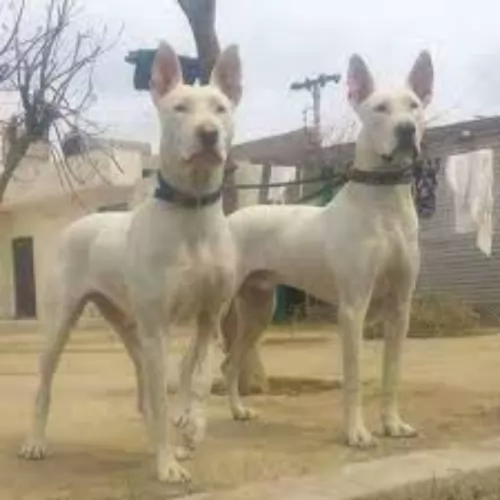 Easy to look after with his short coat, the Gull Terr will only require a brushing twice a week to keep the coat shiny and healthy.
Easy to look after with his short coat, the Gull Terr will only require a brushing twice a week to keep the coat shiny and healthy.
Because his coat is white, it can show dirt easily, and it will simply require taking a damp cloth and wiping the mark off him. You don't want to be bathing him often as this dries his skin out – rather just wipe the coat down.
Your Gull Terr is a highly energetic dog and he loves nothing more than to be involved in robust exercise and games. He is best suited in a home with large grounds and if you do opt to have him in the city, you will have to pay close attention to his exercise needs – lots of walks, runs, ball games, swimming and running with you as you cycle.
You want to be sure that your energetic Gull Terr has a healthy diet full of important proteins, fats, and carbohydrates.
Protein is always important for a dog like this and you want to make absolutely sure that apart from his high quality kibble, you mix in raw meat from time to time as well as cooked chicken, fish, brown rice and vegetables.
When looking for a commercially manufactured dog food, look for high-quality animal protein as a top ingredient. Make sure he always has fresh, cool water available to him.